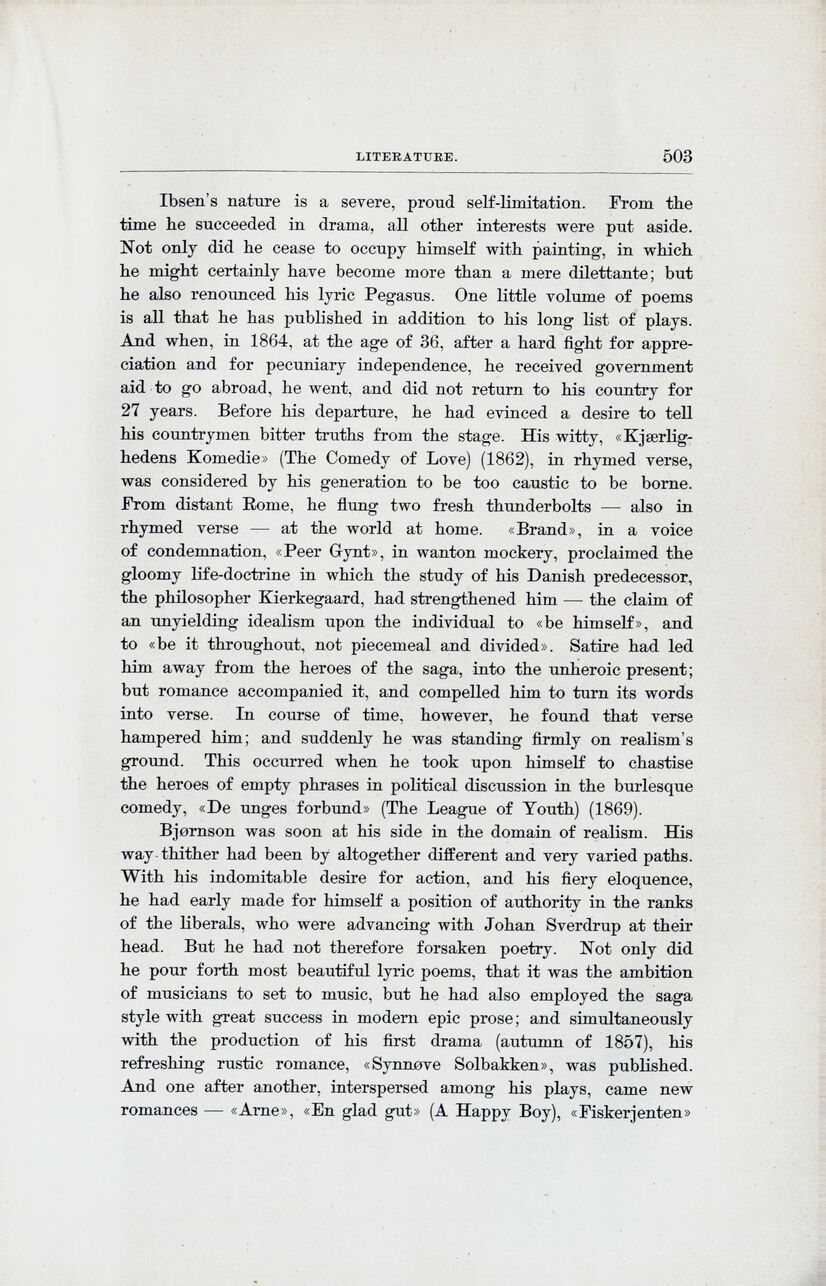
Full resolution (JPEG) - On this page / på denna sida - Literature, by Chr. Brinchmann

<< prev. page << föreg. sida << >> nästa sida >> next page >>
Below is the raw OCR text
from the above scanned image.
Do you see an error? Proofread the page now!
Här nedan syns maskintolkade texten från faksimilbilden ovan.
Ser du något fel? Korrekturläs sidan nu!
This page has been proofread at least once.
(diff)
(history)
Denna sida har korrekturlästs minst en gång.
(skillnad)
(historik)
Ibsen’s nature is a severe, proud self-limitation. From the
time he succeeded in drama, all other interests were put aside.
Not only did he cease to occupy himself with painting, in which
he might certainly have become more than a mere dilettante; but
he also renounced his lyric Pegasus. One little volume of poems
is all that he has published in addition to his long list of plays.
And when, in 1864, at the age of 36, after a hard fight for
appreciation and for pecuniary independence, he received government
aid to go abroad, he went, and did not return to his country for
27 years. Before his departure, he had evinced a desire to tell
his countrymen bitter truths from the stage. His witty,
«Kjærlighedens Komedie» (The Comedy of Love) (1862), in rhymed verse,
was considered by his generation to be too caustic to be borne.
From distant Rome, he flung two fresh thunderbolts — also in
rhymed verse — at the world at home. «Brand», in a voice
of condemnation, «Peer Gynt», in wanton mockery, proclaimed the
gloomy life-doctrine in which the study of his Danish predecessor,
the philosopher Kierkegaard, had strengthened him — the claim of
an unyielding idealism upon the individual to «be himself», and
to «be it throughout, not piecemeal and divided». Satire had led
him away from the heroes of the saga, into the unheroic present;
but romance accompanied it, and compelled him to turn its words
into verse. In course of time, however, he found that verse
hampered him; and suddenly he was standing firmly on realism’s
ground. This occurred when he took upon himself to chastise
the heroes of empty phrases in political discussion in the burlesque
comedy, «De unges forbund» (The League of Youth) (1869).
Bjornson was soon at his side in the domain of realism. His
way thither had been by altogether different and very varied paths.
With his indomitable desire for action, and his fiery eloquence,
he had early made for himself a position of authority in the ranks
of the liberals, who were advancing with Johan Sverdrup at their
head. But he had not therefore forsaken poetry. Not only did
he pour forth most beautiful lyric poems, that it was the ambition
of musicians to set to music, but he had also employed the saga
style with great success in modern epic prose; and simultaneously
with the production of his first drama (autumn of 1857), his
refreshing rustic romance, «Synnøve Solbakken», was published.
And one after another, interspersed among his plays, came new
romances — «Arne», «En glad gut» (A Happy Boy), «Fiskerjenten»
<< prev. page << föreg. sida << >> nästa sida >> next page >>